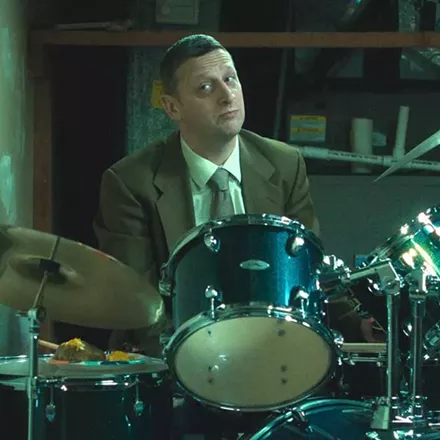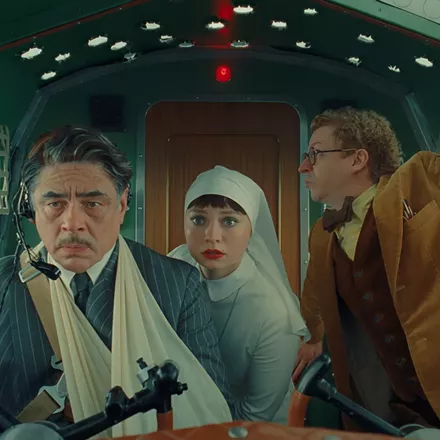Film review: THE ACCOUNTANT 2
Follow-up to the 2016 Ben Affleck action drama embraces the weird, for better or worse.
By Scott Renshaw @scottrenshawIn the event that you've forgotten about The Accountant—and you could be forgiven, since it's been eight-and-a-half years since its theatrical release—permit me to bring you back up to speed: That movie was weird. That starts with the central premise, involving a neurodivergent man named Christian Wolff (Ben Affleck) with a couple of very particular sets of skills. On the one hand, he's a mathematical savant who makes big bank handling the accounting of criminal organizations, and occasionally ratting them out when they violate his personal moral code; on the other hand, he's a badass trained in martial arts and military weaponry. Throw in a convoluted plot involving a treasury department investigation, flashbacks to Christian's time in prison learning his criminal trade and a revelation involving Christian's long-estranged brother Braxton (Jon Bernthal), and you've got one oddball variation on action drama, even before you get to the thorny question of whether Affleck's performance amounted to a kind of autism minstrelsy.
The Accountant did a modestly successful $150 million worldwide in the fall of 2016, nothing that would immediately scream "franchise," and it certainly seemed like the moment for a follow-up would have passed after nearly a decade. Yet here we are, revisiting the world of Christian Wolff with the original creative team of director Gavin O'Connor and screenwriter Bill Dubuque. And you know what? It's still weird. Maybe weirder, even, though that's not necessarily the same as "good."
Part of that expanded sense of oddness comes from how much it's willing to swing tonally from broadly comic to dark. We're reintroduced to Christian as he lives his itinerant life in (for the moment) Boise, engaging in a speed-dating event where he uses his abilities to game the algorithm and gain a lot of interest from various women—until his personality quirks alienate them. Yet that goofiness ends up colliding with a central plot involving human trafficking, as Christian heeds the call of federal agent Marybeth Medina (Cynthia Addai-Robinson, also returning from the first film) to help find out what information her former boss, Ray King (J.K. Simmons), uncovered that led someone to kill him. If you're able to withstand the whiplash between "Christian learns how to line-dance in a honky-tonk bar" and "children held prisoner in a Mexican camp and threatened with mass-murder," you may have come to the right place.
The big selling point, however, has been turning the sibling relationship that was The Accountant's big third-act twist into a focal point of this narrative—and at times, it's kind of delightful. Bernthal gets a couple of showy, amusing solo scenes reminding us both of Braxton's gig as a freelance killer and his occasionally hair-trigger temper before Christian contacts him, asking for help on this whole human-trafficking thing. Dubuque's screenplay earnestly wants to make it matter that Braxton yearns for a connection with Christian that the latter's autism makes challenging, and the scenes in which they attempt their own version of bonding—particularly sharing beers atop Christian's Airstream trailer—generally prove entertaining. They're also an odd fit in a movie that's going to include plenty of broken bones and gunplay as the brothers try to track down a missing boy and the mysterious assassin (Daniella Pineda) Ray was meeting with before his death.
Oh, but wait! I've somehow forgotten to mention the secret team of hackers operating out of the care facility for neurodivergent youth that Christian finances. Again: I will leave it to others far more knowledgeable about such things than I am to determine whether there's anything problematic about the way these movies portray people on the autism spectrum. But these particular people on the autism spectrum don't really seem to have lives before waiting to be called into action by Christian, and their scenes are mostly used as comic relief. For, you know, trying to stop all the human trafficking.
The Accountant 2 ultimately settles into a big climactic shootout, which I suspect is the reason most of the folks in the audience will be coming. In theory, I dig the idea that it takes quite a few loopy steps to get there; we need more movies that feel idiosyncratic in their sensibility, and fewer like the AI-generated version of a genre crowd-pleaser. Sometimes, weird is good. And sometimes, weird is just ... well, weird.
More by Scott Renshaw
-
Writer of the Lost Oligarch
The Phoenician Scheme gets both silly and serious about what makes rich dickheads tick.
- Jun 4, 2025
-
Film Reviews: New Releases for May 30
Karate Kid Legends, Bring Her Back, Jane Austen Wrecked My Life, Bad Shabbos, Tornado
- May 29, 2025
-
JANE AUSTEN WRECKED MY LIFE, BRING HER BACK, June 2025 Special Screenings
Two new releases, plus SLFS Summer Showdown, Wild & Scenic Festival and more.
- May 28, 2025
- More »
Latest in Film Reviews
Readers also liked…
-
Sundance 2025 wrap-up plus February special screenings
Uncertainty about the future location shifts focus away from the movies
- Feb 5, 2025










